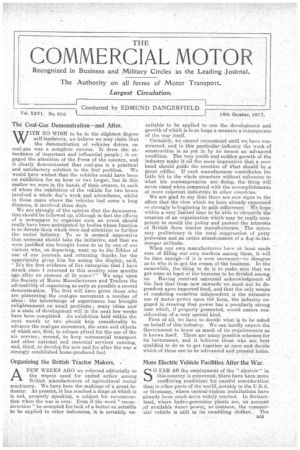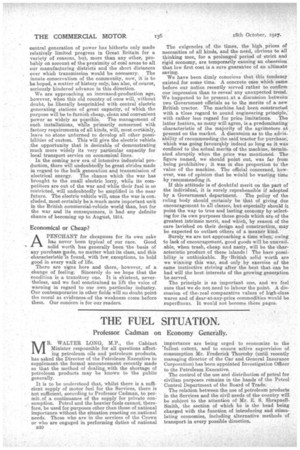The Coal-Gas Demonstration—and After.
Page 1

Page 2

If you've noticed an error in this article please click here to report it so we can fix it.
WITH NO WISH to be in the slightest degree self-laudatory, we believe we may claim that the demonstration of vehicles driven on coal-gas was a complete success. It drew the attendance of important and influential people ; it engaged the attention of the Press of the country, and it clearly demonstrated that coal-gas is a practical and satisfactory solution to the fuel problem. We would have wished that the vehicles could have been on exhibition for an hour or two longer, but in this matter we were in the hands of their owners, to each of whom the exhibition of the vehicle for two hours involved a whole day's work and attendance, whilst in those cases where the vehicles had come a long distance, it involved three days.
We are strongly of the opinion that the demonstration should be followed up, although in fact the efforts of a newspaper to organize such an event should really have been anticipated by bodies whose function , is -to devote their whole time and attention to further the motor industry. To us it seemed imperative that someone should take the initiative, and that we were justified was brought home to us by one of our visitors who, on departing, went up to the Editor of one of our journals and returning thanks for the opportunity given him for seeing the display, said, "It's the first evidence of live enterprise that I have struck since I returned to this country nine months ago after an absence of 38 years ! " We urge upon the Society of Motor Manufacturers and Traders the advisability of organizing as early as possible a second demonstration. The first will have given those who are pioneering the . coal-gas movement a number of ideas : the interchange of experiences has brought enlightenment on small problems ; many ideas now in a state of development will in the next few weeks have been completed. An exhibition held within the next month or two ehould help considerably to advance the coal-gas movement, the aims and objects of which are, first, to release petrol for the use of the air service ; second, to keep commercial transport and other national and essential services running, and, third, to develop for now and for after the war a' strongly established home-produced fuel.
Organizing the British Tractor Makers, • '
AFEW WEEKS AGO we referred editorially to the tregent need for united action among British rnitnufacturers of agricultural motor machinery. We have here the makings of a great industry. At present, it has reached a stage at which it is not, properly speaking, a subject for reconstruction when the war is over. Even if the word " reconstruction " be accepted foe lack of a better as suitable to be applied to other industries, it is certainly un suitable to be applied to one the develoPment and grovith of which is in so large a measure a consequence of the "war itself.
Certainly, we cannot reconstruct until we; have constructed, and in this pa,rticularindustry the work of construction is as yet in by no means an advanced condition. The very youth and sudden growth of the industry make it all the more imperative that a sure band should guide the erection of What should be a great edifice. If each manufacturer contributes his • little bit to the whole structure without reference to what his contemporaries are doing, the thing will never stand when compared with the accomplishments of more coherent industries in other countries. • We are glad to say that there are now signs to the effect that the view which we have already expressed so strongly is beginning to gain -adherence. We hope within a very limited time to be able to chronicle the creation of an organization which may be really -competent to mould the policy and protect the interests of British farm tractor mannfacturers. • The necesa sary preliminary is the total suppression of petty jealousies and an entire abandonment of a dog-in-the manger attitude.. • When our own manufacturers have at least made sure of filling our own markets among them, it will be time eneugh—if it is ever necessarY—to disagree as to who is to get the cream of the business. In the meanwhile' the thing to do is to make sure that we get some at least of the business to be divided among us. Having received universal acknowledgment of the fact that from now onwards we must not be dependent upon imported food, and that the only means of rendering ourselves independent is the extensive use of motor power upon the farm, the industry engaged in creating that power has a peculiarly strong case which, if properly presented, would ensure consideration of a very special kind.
First of all, we have to decide what is to be asked on behalf of this industry. We can hardly expect the Government-to know as much of its requirements as' it knows itself. There are many possible schemes for its betterment, and it behoves those who are best qualified to do so to get together at once and decide which of these are to be advocated and pressed home.
More Electric Vehicle Facilities After the War.
SO FAR AS the employment of the " electrio " in this country is concerned, there have been more conflicting conditions. for careful consideration than in other parts of the world, notably in the U.S.A. or Germany, -where central-station installations have already been much more widely ereCted. In Switzerland, where hydro-generater plants are, on account _of available water power, BO• common, the commercial vehicle is still in its swaddling clothes.. The central generation of power has hitherto only made relatively limited progress in Great Britain for a variety of reasons, but., more than any other, probably on account of the proximity of coal areas to all our manufacturing districts and the short distances over which transmission would be necessary. The innate conservatism of the community, now, it is to be hoped, a matter of history only,has also, of course, seriously hindered advance in this direction.
We are approaching an increased-production age, however, when this old country of ours will, :without doubt, be liberally besprinkled with central electric generating stations of great capacity, of which the purpose will be to furnish cheap, clean and convenient power as widely as possible. The management of such installations, while primarily concerned with • factory requirements of all kinds, will, most certainly, leave no stone unturned to develop all other possibilities of custom. This will give the electric vehicle the opportunity that is desirable of demonstrating much more widely its very particular capacity for local transport service on economical lines.
In the coming new era of intensive industrial production, there will undoubtedly be great strides made in regard to the bulk generation and transmission of electrical energy. The chance which the war has brought to the small electric lorry, while its competitors are out of the war and while their fuel is so restricted, will undoubtedly be amplified in the near future. The electric vehicle will, once the war is concluded, most certainly be a much more important unit in the British commercial-vehicle world than, but for the war and its consequences, it had any definite chance of becoming up to August, 1914,
Economical or Cheap?
PENCHANT for cheapness for its own sake has never been typical of our race. Good solid worth has generally been the basis of any purchase wade, no matter what its class, and this characteristic is found, with 'few, exceptions, to hold good in every walk a life.
There are signs here and there,however, of a change of feeling. Sincerely do we hope that the condition is a transitory one. It is ekistent, nevertheless, and we feel constrained to lift the voice of warning in regard to our own particular industry. Our contemporaries in other fields will no doubt point the moral as evidences of the weakness come before them. Our condern is for our readers. The exigencies of. the times, the high prices of necessities of all kinds, and the, need, obvious to all thinking men, for a prolonged period of strict and rigid economy, are temporarily causing an obsession that low first cost is a sure guarantee of an ultimate saving. We have been dimly conscious that this tendency existed for some time. A concrete case which came before our notice recently served rather to confirm our impression than to reveal any unexpected trend. We happened to be present at a discussion between two Government, officials as to the merits of a new British tractor. The machine had been. constructed with a tlose regard to sound engineering principle,' with rather less regard for price limitations. The latter feature, as many will agree, is a predominating characteristic of the majority of the agrimotone at present on the market. A diecussion as to the advisability of recommending the said tractor for purchase', which was going favourably indeed so long as it was confined to the actual merits of the machine, termine. ated abruptly when the price was mentioned. The figure named, we should point out, was far from , being prohibitive; it wa,s in due proportion to the value of the machine. The official concerned, however, was of opinion that he would be wasting time by recommending it.
If this attitude is of doubtful merit on the part of the individual, it is surely reprehensible if adopted by a Government department. The policy of the ruling body should certainly be that of giving due encouragement to all classes, but especially should it point the way to true and lasting economy by selecting for its own purposes those goods which are of the greatest intrinsic merit, and which, by reason of the care lavished on their design and construction, may be expected to outlast others of a meaner kind.
Surely we are not approaching a time when; owing to lack of encouragement, good goods will be unavailable, when trash, cheap and nasty, will be the characteristic product of these islands 1 The bare possibility, is unthinkable. By 'British_ solid worth are we winning this war, and only by exercise of the same instinctive striving after the best that can be had will the best interests of the growing generation be served.
The principle is an important one, and we feel sure that we do not need to labour the point. A discussion of the real comparative values of high-class wares and of dear-at-any-price commodities would be superfluous. It would not become these pages.
























